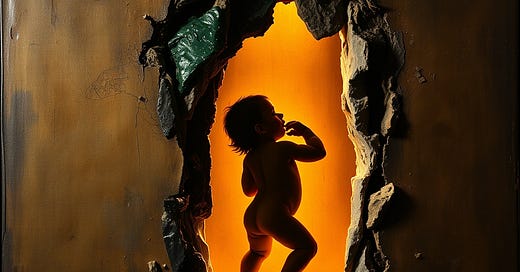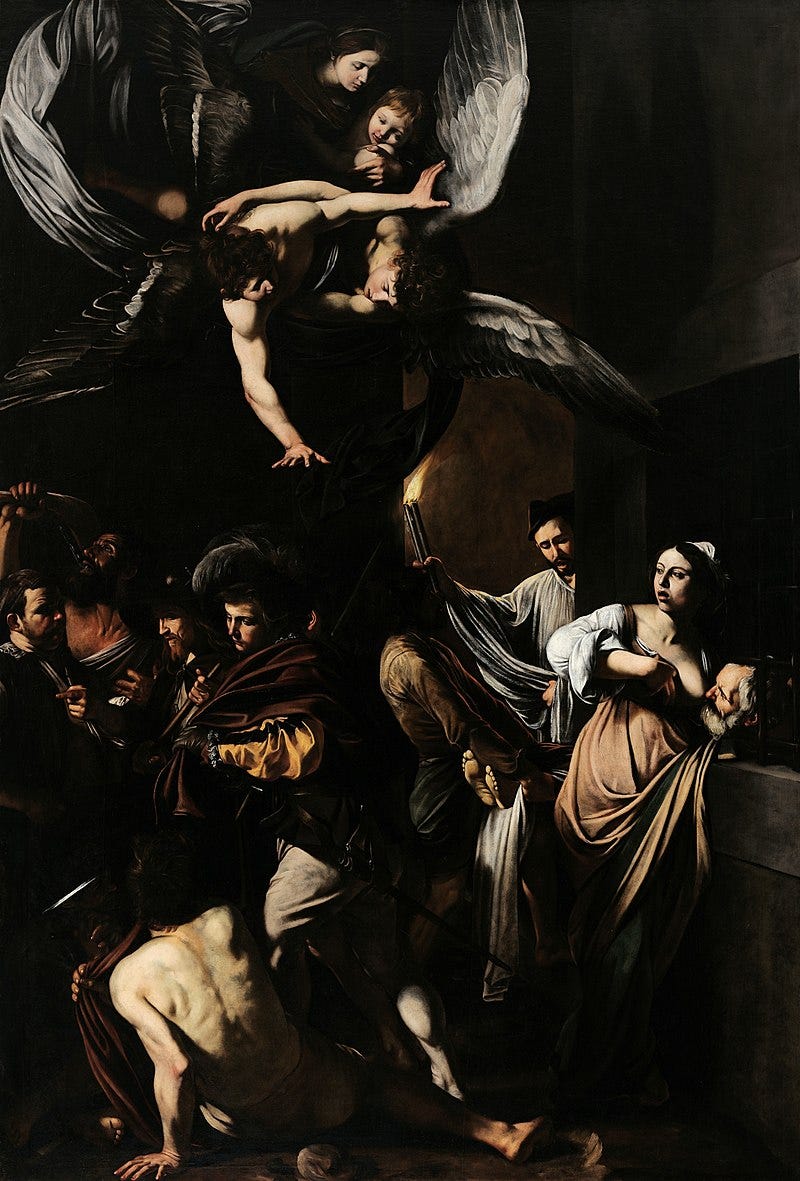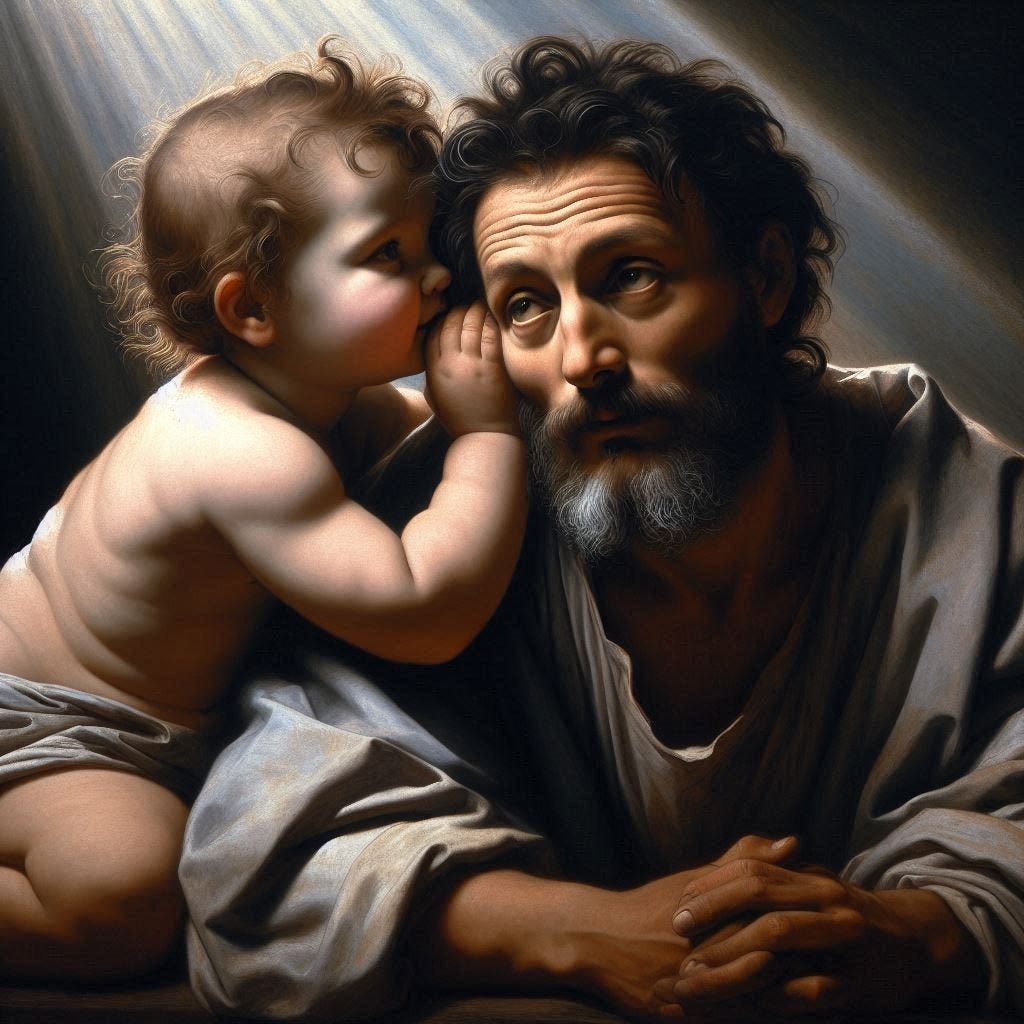Echoes of Naples: When Geolier's Rap Resonates in Caravaggio's Studio
A fictional encounter blending Caravaggio's "Seven works of Mercy" with modern rhythms
A few months ago, I wrote a story about Caravaggio. It was an intimate text, portraying him in his Neapolitan studio while painting "The Seven Works of Mercy." It depicted a moment of artistic creation that had deeply involved me, where I observed him confronting his inner demons and his poignant search for redemption through art.
Then came the music of Emanuele Palumbo, known artistically as Geolier. He is a young rapper from Secondigliano – a neighbourhood on the outskirts of Naples known for its tough social realities and vibrant resilience – who has seen a meteoric rise to become one of Italy's most streamed and discussed contemporary artists, particularly resonant with younger generations. His recent album, “Dio lo sa – Atto II” ("God Knows – Act II"), and especially the track “Reale” ("Real"), did something unexpected: they began to resonate, to almost dialogue, with my older story about Caravaggio.
At first glance, the connection seemed improbable. A rapper from modern-day Secondigliano and a Baroque painter from the 17th century. Yet, listening to Geolier's verses – raw, authentic, laden with meaning, reflecting a world where success and wealth amplify responsibility towards oneself and others – I started to glimpse a subterranean link, a shared energy traversing the centuries, rooted perhaps in the shared Neapolitan ground of intense life, struggle, and spirit. His words seemed like they could already inhabit that secret space within my story. As if they could naturally weave into the flow of Caravaggio's thoughts, enriching them with a dimension both contemporary and ancestral.
This wasn't intended as an intellectual exercise, but came as an intuition – a way to explore the idea that true art knows no boundaries, that authenticity speaks a universal language capable of uniting an old master and an artist shaping today's culture.
So, I decided to interweave some of Geolier's verses into my original Caravaggio story. Not merely as quotes, but as echoes. As voices crossing time to narrate the same enduring human condition.
The article can be read in Italian, as it was originally written, at this link https://crono.news/Y:2024/M:11/D:28/h:18/m:01/s:21/geolier-dio-lo-sa-atto-ii-la-potenza-narrativa-di-geolier-in-un-racconto-con-caravaggio/ on the Italian magazine Crono.news.
Hope you enjoy it.
“So Much, Immense Grace”
Caravaggio stepped back, scrutinising the vast canvas that dominated the north wall of his Naples studio. His latest commission, “The Seven Works of Mercy,” was taking shape.
Echo from the Future – 417 years apart – Geolier, rapper from Secondigliano (henceforth: EfF):
“Avvantaggiato ‘a ‘sta ricchezza, ormaje abitudinaria”
[“Advantaged by this wealth, now routine”]
Flesh of Meaning: The privilege is not material, but spiritual. Wealth lies in the ability to recognise the grace flowing through centuries, an invisible advantage settling in the soul like dew on a forgotten fresco.
A shiver ran down Caravaggio’s spine. Words not his own, yet so intense they seemed already part of his breath. A mysterious echo carrying the sharp, sincere flavour of Naples, though coming from a time he could not comprehend.
He then stepped forward again into the acrid scent of oils, dipping his brush to sketch volumes and shadows. The viscous hues anchored him amidst the seething memories threatening to breach his formidable inner barriers. Focusing intensely on the pigments, he lost himself in the familiar shades of umber, ochre, and lamp black: the colours of shadow and earth that best represented him.
EfF:
“Tengo ‘o munno, vinte figlie, diece pate”
[“I hold the world, twenty children, ten fathers”]
Flesh of Meaning: To generate is not just to generate flesh, but worlds. Every suffering can birth universes, every tear can hold geographies of redemption. Pain is a cosmic womb generating meaning.
Another jolt shot through the Lombard painter. Words that seemed to sprout from his thoughts, yet so clear, so distant, they left him perplexed, his hand trembling on the brush.
As the afternoon light from the high windows turned warm, Caravaggio brought the candlestick closer. The flames danced, casting a carnal glow upon his emerging creation that seemed to breathe life into the images. The figures of the two men took shape, their expressions psychologically complex.
The work was a painted story, steeped in the chaotic, vital, and confusing Naples spanning the 16th and 17th centuries, echoing a suffering humanity where poverty and nobility, sickness and cure, sin and forgiveness, despair and hope coexisted. But in the story, heaven and earth were united by the Virgin and Child, affirming that acts of kindness in this world are a privileged path to Paradise. A work that perhaps reached where words could not.
EfF:
“Nun me paragonà maje cu chi esce fra diec’anne”
[“Never compare me with who comes out in ten years”]
Flesh of Meaning: To refuse classification is to refuse imprisonment. To be undefinable is to be free, to be a passage through which eternity can flow, without levees or boundaries.
Once again, those mysterious words pierced him like a fine blade, leaving him stunned, with a sense of vertigo he couldn't explain.
The entire scene was presided over by the Virgin and Child, both supported by the powerful feathered wings of two angels.
Caravaggio thought aloud:
“I remain hypnotised by her emerging figure, the Madonna cloaked in grace. And the Child Jesus gazing fearlessly upon suffering humanity. Their skin radiates an impossible warmth, though made only of oil and canvas. What grace bestowed, that Heaven should bow so humbly to my person? That Light should shine radiant from a man of shadow such as I am? They offer themselves, transcendent yet real. Unworthy, I am—yes, I know this all too well. Yet She still arises. Yet, He still calls.”
EfF:
“‘C”o dicette a mia mamma ch”o promettette a Daniele”
[“I told my mom that I promised Daniele”]
Flesh of Meaning: The promise is a bridge across time. Not a simple commitment, but a cosmic umbilical cord connecting destinies, binding souls beyond flesh, beyond time.
The words resonated within him, so foreign yet so familiar, leaving him breathless, trembling, and confused. Bending down with a steady hand, the brush adding details to the delicate profile of the young Jesus, a flash of light blinded Caravaggio. Crying out, he stumbled backwards as red and purple spots still lingered in his vision. Gradually, the blinding brightness faded. Blinking, he discerned a curly-haired boy surrounded by a nebulous halo... emerging from the canvas itself. Those timeless eyes reflected eternal wisdom in the childlike countenance... it was the Child Christ himself.
The Divine Child tilted his head, studying the bewildered painter. Then he raised a small hand, palm outstretched, inviting Caravaggio to kneel. Heart pounding, the artist fell to his knees before the strange apparition. Light footsteps brushed the dusty floorboards as the boy leaned forward, rising to whisper, his breath warm against Caravaggio’s ear in the Neapolitan lilt, earthy and eternal like his canvases:
“Chi cammina sempe pe l’ombra, offenne ‘a luce.”
[“He who always walks in shadow, offends the light.”]
The words resonated with intense meaning in Caravaggio’s soul. Jesus laid a hand, light as a feather, upon his bowed head: a blessing and a consecration, peace spreading through his entire being, suspending all sensation beyond that hallowed touch.
The hand gently withdrew, and Caravaggio re-emerged into the familiar studio, with its usual smells and scattered objects. Eyes blurred, he stared at the painting, searching for those oracular eyes, but the figures were merely sketched in umber and black, the corner strangely bare where the Incarnation had appeared moments, or ages, before.
His knees creaked on the rough floorboards as heat welled behind his eyes; Caravaggio fought to contain an overwhelming emotion. Then the divine Whisper echoed again in his mind, in those thick Neapolitan tones, earthy and eternal like his canvases… and his formidable threshold gave way. He collapsed fully, his powerful body wracked by convulsive sobs. A lifetime of repressed anguish and unconsoled sorrow erupted in streams of scalding salt. The cathartic deluge washed through his inner shadows until he knelt empty, purified, and re-consecrated to sacred intent.
Eyes reddened, Caravaggio stared at his calloused hands, steeped in a life's work and now, he prayed, redeemed by heavenly grace. Steady fingers picked up the palette and brush as fresh vision flowed through him. He breathed details into the humble child whose face and hand would complete this masterpiece, echoing that profound Whisper for eternity. However much he fled into shadow and struggled, he would never again offend that Light which would always seek him, find him, and caress him until all darkness yielded to its magisterial grace.
As Caravaggio traced the existing scenes with their symbolic meanings, words resonated deep within his soul:
“Bury the dead” - On the right, men carry a corpse, only the feet visible.
“Visit the imprisoned” - In the centre, Cimon, condemned to starve in prison, receives milk from the breast of his daughter Pero, who secretly nourishes him.
“Feed the hungry” - On the left, a man offers bread to a beggar, while another hands him a bowl.
“Clothe the naked” - Lower left, an angel helps a young man cover himself with a cloak.
“Shelter the homeless/pilgrims” - Upper left, two men welcome a traveller with a staff and wide-brimmed hat.
“Visit the sick” - Lower right, a man tends to another's wound, who has a bandage over his eye.
“Give drink to the thirsty” - Upper right, Samson, after killing the Philistines with the jawbone of an ass, drinks the water that miraculously springs from the jawbone itself by divine will.
So much humanity captured in a single extraordinary canvas.
EfF:
“‘A vittoria arriva quando sbaglie”
[“Victory arrives when you make mistakes”]
Flesh of Meaning: To fall is not to plunge, but to ascend. Error is the secret ladder by which the soul climbs back towards its light. Every wound is an opening, every fall a springboard towards eternity.
A final mysterious echo traversed him as he resumed painting, leaving him stunned and, simultaneously, deeply moved.
So much, immense Grace.
Join the conversation! Please share your thoughts and insights in the comments below.
Discover more stories and reflections in my books.
You can also connect with my professional journey on LinkedIn.
I value your input. Reach out with feedback, suggestions, or inquiries to: cosmicdancerpodcast@gmail.com.
Grateful for your time and readership.






